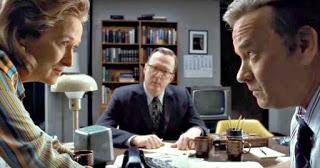 Critics enjoy noting, to the point of tedium, Steven Spielberg's bifurcation between gee-whiz blockbusters and somber adult dramas. I'll go further: Spielberg the Serious Filmmaker comes in two flavors. There's the thoughtful craftsman behind Lincoln and Schindler's List, and the workmanlike drudge behind The Terminal and Bridge of Spies. Even by the latter's standards, The Post (2017) is remarkably underwhelming, flattening a fascinating story into middlebrow Oscar bait.
Critics enjoy noting, to the point of tedium, Steven Spielberg's bifurcation between gee-whiz blockbusters and somber adult dramas. I'll go further: Spielberg the Serious Filmmaker comes in two flavors. There's the thoughtful craftsman behind Lincoln and Schindler's List, and the workmanlike drudge behind The Terminal and Bridge of Spies. Even by the latter's standards, The Post (2017) is remarkably underwhelming, flattening a fascinating story into middlebrow Oscar bait.It's 1971, and America's deeply mired in the Vietnam War. Pentagon expert Daniel Ellsberg (Matthew Rhys) leaks the Pentagon Papers, a savagely detailed catalog of government lies about the war, to the New York Times. The Washington Post, run by Katharine Graham (Meryl Streep) and her cocky editor Ben Bradlee (Tom Hanks), is frustrated about being scooped until Richard Nixon blocks the Papers' continued publication. When the Post comes into their own copy of the Papers, Graham, Bradlee and their fellow officials debate whether to publish them, at risk of business failure, government prosecution and personal ruin.
Though The Post's subject, setting and characters inevitably evoke All the President's Men, Spielberg's film is way too earnest for that '70s thriller feel. Instead, it's one of those bloodless liberal dramas about noble journalists defending the Republic from reactionary scourges through the Power of Journalism. There's no question Spielberg envisioned this film as a defense of free press against the sub-moronic monsters who belch "FAKE NEWS" at everything they dislike; unfortunately, its attempts at timeliness come at the expense of storytelling.
Spielberg and writers Josh Singer (who penned the far superior Spotlight) and Liz Hannah evoke the early '70s through cliched shorthand: an inconsequential Vietnam ambush, an antiwar rally, occasional rock songs and cameos by historical figures like Ellsberg, Robert McNamara (Bruce Greenwood) and Art Buchwald (David Costabile). Richard Nixon appears only in shadow, with Spielberg using the White House tapes to chronicle his role in the story. There's no dramatic thrust to any of thus, and little authenticity or immersiveness beyond the meticulous art direction. The result is a flat, cardboard diorama of history.
Which might be okay, if the central story were well-told. Unfortunately, The Post telescopes most of its events into a few short days as Graham and Bradlee debate whether or not to publish. Rather than heightening the tension, this device instead flattens the story, reducing plot development and characterization to a hasty checklist of set pieces and expository dialog. The few scenes that work are almost self-contained: the Post's gofer infiltrating the Times to steal their scoop, assistant editor Ben Bagdikan (Bob Odenkirk) contacting Ellsberg and others, the inevitable sparring between Graham and Bradlee over their decision-making. Without tension or dramatic flow, The Post resorts too readily to chest-thumping about free speech as tedious as it is self-important.
Spielberg largely wastes an impeccable cast, who desperately tries investing the material with gravitas. Meryl Streep is well-cast as Katharine Graham, but the script makes her so wishy-washy and equivocal it's hard to root for her. We're meant to consider Graham a tough woman struggling in a Man's World but she's not a strong enough character for that register. Spielberg's never been a great woman's director but his mishandling of Streep feels singularly egregious. Nor is she helped by a coterie of talented actresses floundering in inconsequential roles: Alison Brie as Graham's doting daughter, Sarah Paulson as Bradlee's sandwich-making wife, Carrie Coon as a snarky spear-carrier.
Tom Hanks' performance mostly consists of a sardonic dog growl and profanity: the only depth granted to his character is his protectiveness towards the Kennedys, fearing that the Papers will besmirch their legacy. He certainly won't make moviegoers forget Jason Robards in All the President's Men. Bruce Greenwood, Tracy Letts and Bob Odenkirk are cast to type and perform competently. Bradley Whitford plays an obnoxious stockholder who mostly spouts sexist naysaying. David Costabile and Michael Stuhlbarg, veterans of Lincoln, are strictly at the cameo level.
Movies like The Post are hard to evaluate. It's not bad in the sense that, say, a Transformers sequel is bad. It's well-cast, competently made and terminally dull. Perhaps Spielberg and friends were too busy patting themselves on the back for their braveness in poking the Demon in the White House to actually, you know, tell a worthwhile story. It's as good an explanation as any for how they made such a fascinating tale so boring.

